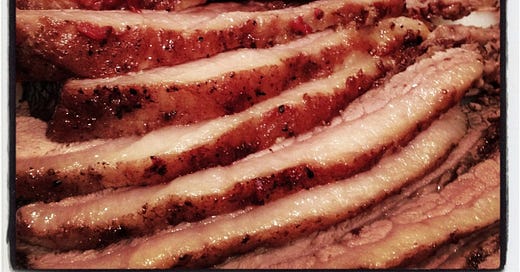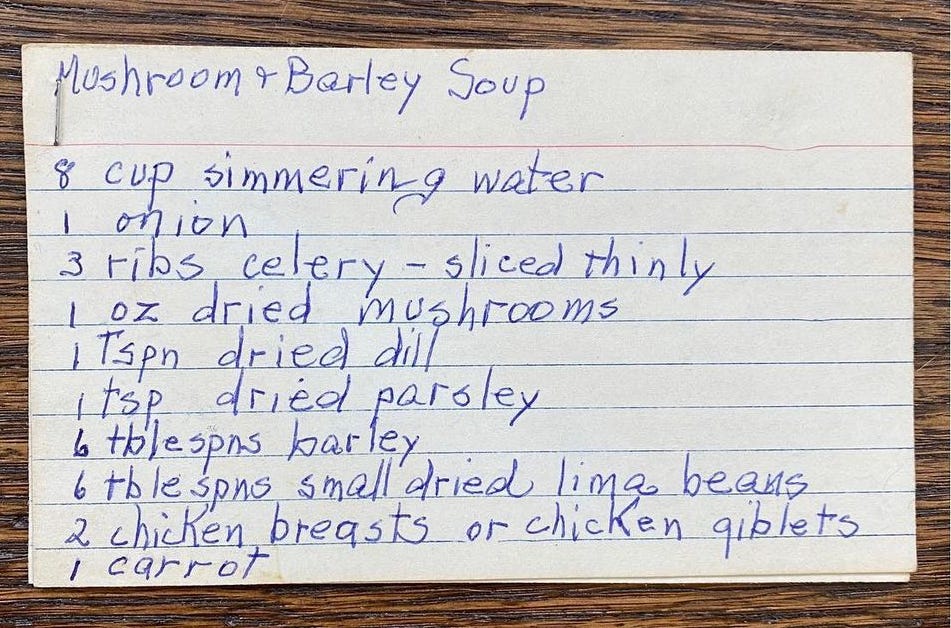“The days aren’t discarded or collected, they are bees that burned with sweetness or maddened the sting: the struggle continues, the journeys go and come between honey and pain. No, the net of years doesn’t unweave: there is no net.”
– Pablo Neruda, Still Another Day
Some time ago, a friend from college told me about a brisket
that her mother used to make every year for the Jewish holidays. My friend visibly swooned as she talked about it — the buildup, the frantic shopping for the deckle, the preparation for cooking that involved her mother taking an old, bent Ginsu filet knife and making small, deep slits in the meat into which she would insert narrow slivers of garlic. One year, she added raisins and dill (her garden was still thriving) to the garlic. Another year, she included small slices of Jerusalem artichoke, which she thought was appropriate, she told everyone, on account of the nature of the holiday.
And every year, she cooked her brisket until it had the consistency of beef jerky.
This is the most exquisite brisket you’ve ever made, Mom, everyone would say in unison, sitting around the formal table and sawing at the meat in front of them. Then they’d put down the family silver and applaud. Mom would stand up and bow deeply from the waist, blush a deep crimson and insist that everybody have a second and third helping, because there was always so much left over. She’d proudly wrap up slices for everyone to take home, and after the meal was over and my friends’ sisters, brothers, nieces and nephews got into their cars, smiled and waved goodbye, they drove to the nearest dumpster and threw the brisket out because it was vile, inedible, and everyone hated it.
This went on for forty years.
I remember it so well, my friend said, smiling sadly and growing misty. She still has the Ginsu knife.
Of course it was memorable. But how could she swoon? Was it a good memory? Or was it a bad one? Was it the meat she was missing, or the whole event and the people involved in it, or was it just her mother? This is a universal conundrum: bad memories are inevitably married to good, the delicious is always somehow married to the stomach-turning. As Neruda says, the journeys go and come between honey and pain. You can’t have one without the other.
The past is also stuff; it masquerades as your mother’s muffin tin.
The past — memory — is everywhere we turn, right in front of us; it lives in the recesses of our brains and makes us who we are, even as our palates taste it and our brains contort it and make my experience different from yours, while the facts are identical. The past is also stuff; it masquerades as your mother’s muffin tin; the bags of photographs that you haven’t had the time or inclination to sort or frame, but that you’ve carried around with you for twenty-five years, moving from house to house and city to city. It’s people who no longer exist in your life — they’ve left the building in one way or another, like Elvis, disappearing, shrinking like a figure in a rear view mirror — but you vividly remember the density of their matzo balls, or the lightness of their gefilte fish, their sense of humor and their frightening temper, and the forty holidays you spent together. You remember the Swedish meatballs made with ketchup and cream that your grandmother used to cook for Thanksgiving and her leftover Easter ham salad tossed with the chopped sweet gherkins that no one but you ever really liked.
Memory is a two-edged sword: relinquish it, and your self goes with it. Cling to it, and you forget where you are in the present.
It’s the stained recipe cards written in Yiddish script that no one has been able to read for sixty years, that you cannot bring yourself to throw out even though the beloved great aunt who wrote them never tried to hide the fact that she didn’t like you, and even at five years old, you knew it. It’s the Passover Haggadah — the one you can’t manage to part with even though it’s splattered with heavy Malaga from the time your long-dead grandmother spilled her Waterford goblet while reaching across the table for the soup nuts. It’s the gaggle of stuffed miniature teddy bears dressed in bunny outfits that your mother found charming, and the four black and red Ukrainian Easter eggs that you meticulously hand-painted for her one Sunday afternoon in 1977 while listening to Patti Smith when, somehow, inexplicably, you managed to stay in the lines because you weren’t stoned.
This is the stuff from our past that we cling to—the good, the bad, and both. These are the memories that we grasp on to for dear life, that refuse to be flushed from our mental catacombs, and that act as a tether to who we once were before we became who we are now. Memory is a two-edged sword: relinquish it, and your self goes with it. Cling to it, and you forget where you are in the present; it stands in the doorway and blocks up the hall. It muddies the future and obscures the light.
I am currently at work on my next book, On Permission, but I’m also writing a new introduction for my first book, Poor Man’s Feast, which, in 2023, will be celebrating its tenth anniversary. When it came out a decade ago, there was enormous excitement and joy, and anything that could possibly go wrong, did: there was illness, death, misunderstanding, and even shunning. There was a lot of time spent trying to untangle the strands of memory in order to separate the good from the bad, and to make sense of them; it was a difficult task — they’re so tightly plaited that where one goes, so goes the other. I spent every holiday clinging to memories of the way things had once been — the family recipes and the soup nuts; the photographs and the gefilte fish. And because holidays are an annual thing, this attempt at trying to disengage from certain memories happens to me spontaneously, every year, year in and year out.
During this time — with all of my focus on the past instead of the present, the here and now — the food I cook ends up tasting blander. The memory strands have been so many and have gotten so jumbled up like old jewelry clogging my dresser drawer that it’s taken me this long to finally realize that some strands simply don’t want to be unraveled; in those cases, where the bad outweighs the good, you just need to let them go, to plop them on a small inflatable raft with a box of glazed donuts and push them out into the water with a wish for peace and luck, and then, as the late Jesse Winchester sang, wave goodbye.
It has taken me a decade to finally throw open the windows and pull back the curtains to let in light and air; these days, I need light like a drowning man needs a life preserver. I’m desperate for it. I want to purge a lot of what I’ve hauled around with me — the bad memories, the unnecessary stuff, the monkey on my back — that’s blackened the windows with knotted veils of worry and fear, and prevented me from breathing deeply, cooking and tasting with purpose and intensity, and moving forward the way I want and need to: with Susan, and with an eye on the past but also very certainly in the here and now, and looking to our future with the wonderful circle of family-by-choice and friends who love and surround us. This is not memory; this is what life is. This is what’s real.
For every disgusting brisket made with dill and garlic and raisins, it’s the happiness, kindness, and love swirling around it that stays. And that’s enough.
Not My Grandmother’s Brisket
Of all the brisket recipes I’ve tried — variations involving chili sauce, cumin, water, curry—this is the one I return to over and over again. It is very much NOT the way my paternal grandmother made it, although it does include her drill-holes-for-garlic method. While her version was mouthwateringly delicious and tender — nary a Jerusalem artichoke or raisin in sight — I still prefer brisket when it’s braised with tomatoes, wine and herbs. The leftovers are stellar.
Serves 4, with leftovers
1 4-pound first cut brisket, trimmed of some excess fat but not all
1 garlic clove, peeled and slivered
salt and pepper to taste
1 tablespoon grapeseed oil
3 medium onions, peeled and thinly sliced
1 cup dry red wine (or beef stock if you’d rather not use wine)
1 16 ounce can plum tomatoes, smashed in their own juice
3 medium carrots, peeled and sliced on the bias
2 celery stalks, sliced on the bias
1 bay leaf
2 sprigs each rosemary and thyme
Bring the brisket to room temperature, place it on a cutting board fat-side down, and using a sharp, thin knife — I use a filleting knife — make small slits (no more than 1/4 inch long) all over the meat, and insert 1-2 slivers of garlic deeply into each slit. Salt and pepper the meat on both sides and massage it with the grapeseed oil.
Preheat oven to 300 degrees F.
In a large, heavy, straight-sided, non-reactive saute pan with a lid (you can use a shallow, fire-proof roasting pan too) set over medium-high heat, brown the meat fat-side down, about 5-8 minutes. Turn the meat over and repeat; you should wind up with a good, strong golden brown crust as in the image above. Remove, set aside, and add the onions to the pan. Toss well until they’re coated with the fat, and return the meat to the pan, setting it on top of the onions along with its accumulated juices, skin-side down.
Add the wine and tomatoes to the pan, cover tightly — if the pan doesn’t have a cover, tightly wrap it in heavy duty foil — and place in the oven for 3 hours. Baste the meat with its juices frequently. After 2 hours, add the carrot, celery, bay leaf, rosemary, and thyme, and continue to braise for another hour, basting frequently.
Remove the pan and allow to come to room temperature; place in refrigerator, covered, overnight.
The next day, skim all of the accumulated fat from the pan; remove the meat from the pan and slice it carefully across the grain. Return it to the pan, and reheat, covered, at 300 degrees F until tender. Serve hot, or at room temperature.







I love this and have a brisket question! A few years ago, I stopped cooking brisket in wine because I thought I’d noticed that it made the resulting joint tougher than if I just used water. But I was never sure. Clearly this isn’t something you’ve observed & I can go back to wine? That is - in the immortal words of a white man at the back of a lecture hall - more of a comment than a question, sorry.
You are incredibly wise and insightful. I think you’re able to communicate so well what so many feel but words elude us and certainly our ability to harness them into an understanding of our human condition(s). Thank you